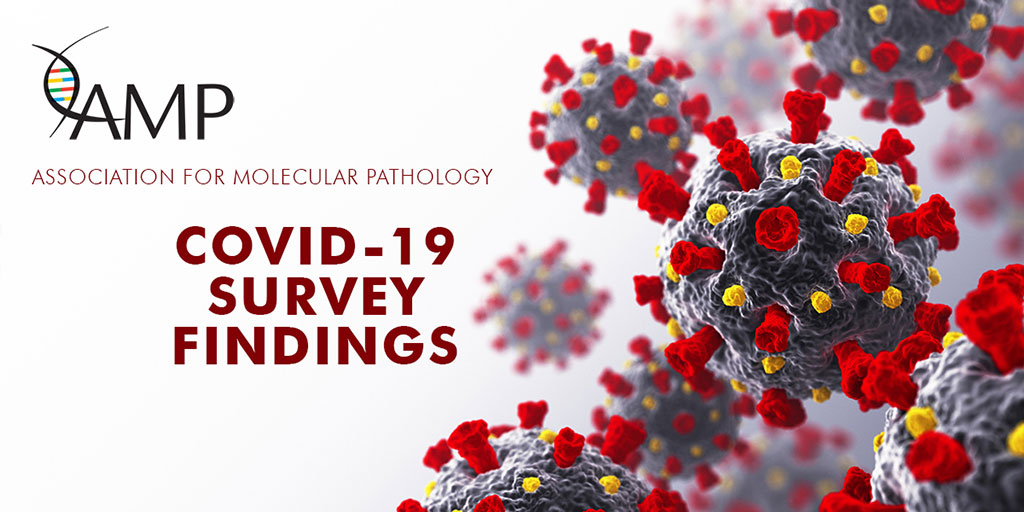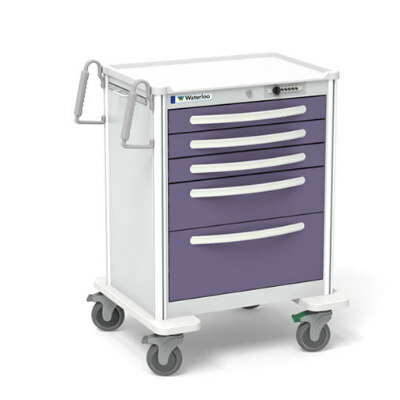Supply Chain Issues Continue to Impact Labs Providing SARS-CoV-2 Testing, Finds AMP Survey
|
By HospiMedica International staff writers Posted on 30 May 2020 |

Illustration
Preliminary results of a SARS-CoV-2 testing survey for clinical laboratories have revealed that more than 70% have experienced supply chain interruptions that have resulted in significant delays.
The Association for Molecular Pathology {(AMP) Rockville, MD, USA}, a global, molecular diagnostic professional society, surveyed more than 100 clinical laboratory professionals across the US to gather their feedback on COVID-19 diagnostic testing environment and recommendations to improve future pandemic responses. AMP’s 67-question anonymous survey assessed many important aspects of SARS-CoV-2 molecular diagnostic testing, including methodology, performance, capacity, supply chain, regulatory, and reporting requirements.
The preliminary results of the survey, which included feedback from 118 representatives from US-based academic medical centers, commercial reference laboratories and community hospitals, indicated that 85% of the respondents are currently offering SARS-CoV-2 testing to patients, while another 10% are currently in the test validation phase. 90% of the laboratories recognize the need to increase diagnostic testing capacity further, and they are working hard to make this happen in the next few months. However, more than 70% of these laboratories have experienced supply chain interruptions that have resulted in significant delays, in many cases forcing them to validate at least three different diagnostic testing methods at the same time just in case the supply of reagents or materials runs out. These supply shortages have included everything from the RNA extraction kits, primers, probes, and enzymes to the physical sample collection materials, such as the swabs and containers for storage and transportation.
“Clinical laboratories across the country are working hard and being extremely resourceful in order to provide diagnostic SARS-CoV-2 testing to Americans, with the majority running at full staffing/testing capacity seven days a week,” said Karen E. Weck, MD, AMP President and Professor of Pathology and Laboratory Medicine, Professor of Genetics and Director of Molecular Genetics and Pharmacogenomics at University of North Carolina Chapel Hill. “However, AMP members know more testing is needed as the country begins to reopen. We are continuing to deploy multiple testing methodologies to overcome supply shortages, increase capacity and improve turnaround times.”
Related Links:
Association for Molecular Pathology (AMP)

The Association for Molecular Pathology {(AMP) Rockville, MD, USA}, a global, molecular diagnostic professional society, surveyed more than 100 clinical laboratory professionals across the US to gather their feedback on COVID-19 diagnostic testing environment and recommendations to improve future pandemic responses. AMP’s 67-question anonymous survey assessed many important aspects of SARS-CoV-2 molecular diagnostic testing, including methodology, performance, capacity, supply chain, regulatory, and reporting requirements.
The preliminary results of the survey, which included feedback from 118 representatives from US-based academic medical centers, commercial reference laboratories and community hospitals, indicated that 85% of the respondents are currently offering SARS-CoV-2 testing to patients, while another 10% are currently in the test validation phase. 90% of the laboratories recognize the need to increase diagnostic testing capacity further, and they are working hard to make this happen in the next few months. However, more than 70% of these laboratories have experienced supply chain interruptions that have resulted in significant delays, in many cases forcing them to validate at least three different diagnostic testing methods at the same time just in case the supply of reagents or materials runs out. These supply shortages have included everything from the RNA extraction kits, primers, probes, and enzymes to the physical sample collection materials, such as the swabs and containers for storage and transportation.
“Clinical laboratories across the country are working hard and being extremely resourceful in order to provide diagnostic SARS-CoV-2 testing to Americans, with the majority running at full staffing/testing capacity seven days a week,” said Karen E. Weck, MD, AMP President and Professor of Pathology and Laboratory Medicine, Professor of Genetics and Director of Molecular Genetics and Pharmacogenomics at University of North Carolina Chapel Hill. “However, AMP members know more testing is needed as the country begins to reopen. We are continuing to deploy multiple testing methodologies to overcome supply shortages, increase capacity and improve turnaround times.”
Related Links:
Association for Molecular Pathology (AMP)

SARS‑CoV‑2/Flu A/Flu B/RSV Sample-To-Answer Test
SARS‑CoV‑2/Flu A/Flu B/RSV Cartridge (CE-IVD)
Latest COVID-19 News
- Low-Cost System Detects SARS-CoV-2 Virus in Hospital Air Using High-Tech Bubbles
- World's First Inhalable COVID-19 Vaccine Approved in China
- COVID-19 Vaccine Patch Fights SARS-CoV-2 Variants Better than Needles
- Blood Viscosity Testing Can Predict Risk of Death in Hospitalized COVID-19 Patients
- ‘Covid Computer’ Uses AI to Detect COVID-19 from Chest CT Scans
- MRI Lung-Imaging Technique Shows Cause of Long-COVID Symptoms
- Chest CT Scans of COVID-19 Patients Could Help Distinguish Between SARS-CoV-2 Variants
- Specialized MRI Detects Lung Abnormalities in Non-Hospitalized Long COVID Patients
- AI Algorithm Identifies Hospitalized Patients at Highest Risk of Dying From COVID-19
- Sweat Sensor Detects Key Biomarkers That Provide Early Warning of COVID-19 and Flu
- Study Assesses Impact of COVID-19 on Ventilation/Perfusion Scintigraphy
- CT Imaging Study Finds Vaccination Reduces Risk of COVID-19 Associated Pulmonary Embolism
- Third Day in Hospital a ‘Tipping Point’ in Severity of COVID-19 Pneumonia
- Longer Interval Between COVID-19 Vaccines Generates Up to Nine Times as Many Antibodies
- AI Model for Monitoring COVID-19 Predicts Mortality Within First 30 Days of Admission
- AI Predicts COVID Prognosis at Near-Expert Level Based Off CT Scans
Channels
Artificial Intelligence
view channel
AI-Powered Algorithm to Revolutionize Detection of Atrial Fibrillation
Atrial fibrillation (AFib), a condition characterized by an irregular and often rapid heart rate, is linked to increased risks of stroke and heart failure. This is because the irregular heartbeat in AFib... Read more
AI Diagnostic Tool Accurately Detects Valvular Disorders Often Missed by Doctors
Doctors generally use stethoscopes to listen for the characteristic lub-dub sounds made by heart valves opening and closing. They also listen for less prominent sounds that indicate problems with these valves.... Read moreCritical Care
view channel
AI to Improved Diagnosis of Atrial Fibrillation
Abnormal heart rhythms frequently arise from—and contribute to—structural abnormalities in the heart. Atrial fibrillation is a specific type of abnormal rhythm that may not be consistently present, often... Read more
Stretchable Microneedles to Help In Accurate Tracking of Abnormalities and Identifying Rapid Treatment
The field of personalized medicine is transforming rapidly, with advancements like wearable devices and home testing kits making it increasingly easy to monitor a wide range of health metrics, from heart... Read more
Machine Learning Tool Identifies Rare, Undiagnosed Immune Disorders from Patient EHRs
Patients suffering from rare diseases often endure extensive delays in receiving accurate diagnoses and treatments, which can lead to unnecessary tests, worsening health, psychological strain, and significant... Read moreSurgical Techniques
view channel
Tiny Wraparound Electronic Implants to Revolutionize Treatment of Spinal Cord Injuries
The spinal cord functions as a vital conduit, transmitting nerve impulses to and from the brain, much like a highway. When the spinal cord is damaged, this flow of information is disrupted, leading to... Read more
Small, Implantable Cardiac Pump to Help Children Awaiting Heart Transplant
Implantable ventricular assist devices, available for adults for over 40 years, fit inside the chest and are generally safer and easier to use than external devices. These devices enable patients to live... Read moreGastrointestinal Imaging Capsule a Game-Changer in Esophagus Surveillance and Treatment
A newly-developed gastrointestinal imaging capsule is poised to be a game-changer in esophagus surveillance and interventions. The Multifunctional Ablative Gastrointestinal Imaging Capsule (MAGIC) developed... Read more
World’s Smallest Laser Probe for Brain Procedures Facilitates Ablation of Full Range of Targets
A new probe enhances the ablation capabilities for a broad spectrum of oncology and epilepsy targets, including pediatric applications, by incorporating advanced laser and cooling technologies to support... Read morePatient Care
view channelFirst-Of-Its-Kind Portable Germicidal Light Technology Disinfects High-Touch Clinical Surfaces in Seconds
Reducing healthcare-acquired infections (HAIs) remains a pressing issue within global healthcare systems. In the United States alone, 1.7 million patients contract HAIs annually, leading to approximately... Read more
Surgical Capacity Optimization Solution Helps Hospitals Boost OR Utilization
An innovative solution has the capability to transform surgical capacity utilization by targeting the root cause of surgical block time inefficiencies. Fujitsu Limited’s (Tokyo, Japan) Surgical Capacity... Read more
Game-Changing Innovation in Surgical Instrument Sterilization Significantly Improves OR Throughput
A groundbreaking innovation enables hospitals to significantly improve instrument processing time and throughput in operating rooms (ORs) and sterile processing departments. Turbett Surgical, Inc.... Read moreHealth IT
view channel
Machine Learning Model Improves Mortality Risk Prediction for Cardiac Surgery Patients
Machine learning algorithms have been deployed to create predictive models in various medical fields, with some demonstrating improved outcomes compared to their standard-of-care counterparts.... Read more
Strategic Collaboration to Develop and Integrate Generative AI into Healthcare
Top industry experts have underscored the immediate requirement for healthcare systems and hospitals to respond to severe cost and margin pressures. Close to half of U.S. hospitals ended 2022 in the red... Read more
AI-Enabled Operating Rooms Solution Helps Hospitals Maximize Utilization and Unlock Capacity
For healthcare organizations, optimizing operating room (OR) utilization during prime time hours is a complex challenge. Surgeons and clinics face difficulties in finding available slots for booking cases,... Read more
AI Predicts Pancreatic Cancer Three Years before Diagnosis from Patients’ Medical Records
Screening for common cancers like breast, cervix, and prostate cancer relies on relatively simple and highly effective techniques, such as mammograms, Pap smears, and blood tests. These methods have revolutionized... Read morePoint of Care
view channel
Critical Bleeding Management System to Help Hospitals Further Standardize Viscoelastic Testing
Surgical procedures are often accompanied by significant blood loss and the subsequent high likelihood of the need for allogeneic blood transfusions. These transfusions, while critical, are linked to various... Read more
Point of Care HIV Test Enables Early Infection Diagnosis for Infants
Early diagnosis and initiation of treatment are crucial for the survival of infants infected with HIV (human immunodeficiency virus). Without treatment, approximately 50% of infants who acquire HIV during... Read more
Whole Blood Rapid Test Aids Assessment of Concussion at Patient's Bedside
In the United States annually, approximately five million individuals seek emergency department care for traumatic brain injuries (TBIs), yet over half of those suspecting a concussion may never get it checked.... Read more
New Generation Glucose Hospital Meter System Ensures Accurate, Interference-Free and Safe Use
A new generation glucose hospital meter system now comes with several features that make hospital glucose testing easier and more secure while continuing to offer accuracy, freedom from interference, and... Read moreBusiness
view channel
Johnson & Johnson Acquires Cardiovascular Medical Device Company Shockwave Medical
Johnson & Johnson (New Brunswick, N.J., USA) and Shockwave Medical (Santa Clara, CA, USA) have entered into a definitive agreement under which Johnson & Johnson will acquire all of Shockwave’s... Read more
















